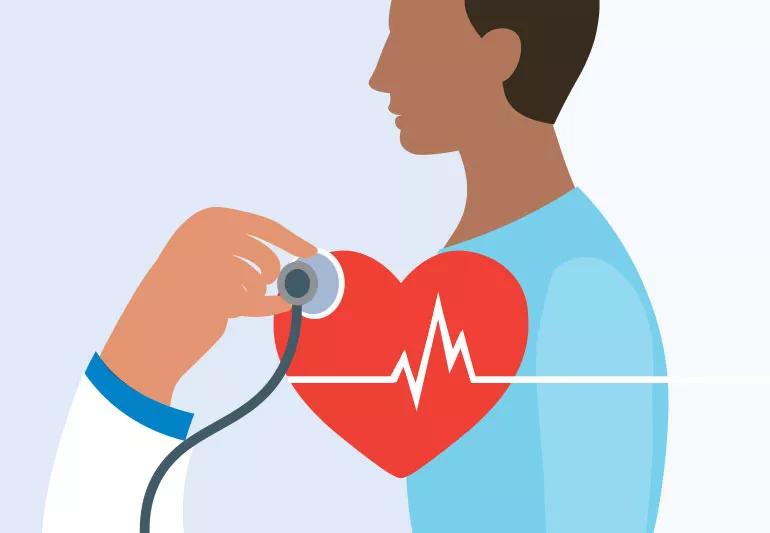A skipped heartbeat is usually your heart returning to its normal electrical path

Image content: This image is available to view online.
View image online (https://assets.clevelandclinic.org/transform/2ec07e0b-882c-402d-a127-9e6139f516b3/physician-Checks-Heartbeat-1456456651-770x533-1_jpg)
Physician checks the heartbeat of patient.
People often talk about their heart skipping a beat in a love-at-first-sight kind of way. The stars aligned. Your eyes twinkled. Your heart fluttered.
Advertisement
Cleveland Clinic is a non-profit academic medical center. Advertising on our site helps support our mission. We do not endorse non-Cleveland Clinic products or services. Policy
Or maybe it wasn’t so romantic. Maybe you were just at your desk and felt a weird “thump” in your chest and wondered what that was all about.
Skipped heartbeats aren’t just rom-com fodder, they’re real sensations that come from a misfiring in your heart’s electrical pathways. (Less romantic-sounding, sure — but more likely to happen in real life than a disillusioned architect and career-driven journalist falling in love as they reach for the same taxi on a cold winter night.)
We talked with cardiologist Tamanna Singh, MD, about skipped heart beats. Why do they happen? And what are they telling you?
The electrical impulses that control your heart rhythm aren’t exactly the stuff of romance novels, but they’re worth understanding — especially when your heartbeat starts dancing to its own tune.
Typically, your heart beats as a steady lub-dub, lub-dub that you don’t even notice as you go about your day. But sometimes, that steady rhythm goes off-beat like a middle school drum line. That’s called a heart palpitation.
Some people describe palpitations as feeling like a skipped beat. Some call it a flutter. Or a thump. Or a bang. It’s all describing the same sensation.
Here’s what’s going on behind the scenes.
Advertisement
When your heart beats, it typically starts as an electrical impulse in the top right chamber of your heart. That makes the top of your heart contract. That signal then works its way down to the bottom chambers of your heart. That makes the bottom of your heart contract.
“And that all happens instantaneously,” Dr. Singh explains. “Your heart beats about 60 to 100 times per minute, depending on your heart rate, starting at the top and moving to the bottom.”
But occasionally, your heart can get a little jolt of electricity that doesn’t follow that typical path. Maybe it comes from the bottom of your heart instead of the top, or maybe from somewhere else in your heart, but not from its normal place. (We’ll talk about why that happens in a bit.)
The bottom chambers will still contract like they’re supposed to, but there’s a brief pause before the next “normal” heartbeat, following the normal electrical path.
“We call that a compensatory pause,” Dr. Singh further explains. “And what typically happens is that people will feel the beat right after the pause. That’s because during the compensatory pause, the heart is filling with extra blood, so that next contraction tends to be much stronger.”
So, what you experience as a skipped heartbeat — a palpitation — is really your heart taking a moment to get back on track.
So, if a skipped beat is a reaction to an electrical impulse from a different location within your heart, what’s causing that sensation in the first place?
Heart palpitations are often not serious. Sometimes, a skipped heartbeat is a reaction to factors like:
But less commonly, heart palpitations can be associated with more concerning conditions, like:
A skipped heartbeat here and there is probably nothing to worry about, especially if it’s not associated with any concerning symptoms, Dr. Singh says. Just about everyone gets palpitations every now and again, whether you feel them or not.
But how do you know whether your skipped beats are the “whoops-I-drank-too-much-coffee” kind or the “better-see-a-doctor-STAT” kind?
First, take a deep breath. Worrying about palpitations can increase your anxiety, which further feeds those skipped-beat sensations. Try some home remedies to calm palpitations, like breathwork and vagal maneuvers.
Advertisement
Next, take a moment to consider what may be going on.
Dr. Singh recommends asking yourself a few questions to gauge the potential seriousness of what you’re experiencing:
“If you can answer ‘yes’ to any of those questions, that would be a good reason to call a healthcare provider, like a primary care provider or cardiologist,” Dr. Singh advises. “Particularly if those sensations or other symptoms are interrupting your day. Sometimes, it’s just a sensation that isn’t translating to an electrical variation. But sometimes, it’s something that may be concerning.”
Sure, your heart may skip a beat when you lock eyes with that special someone, but not all palpitations are the heart-eye emoji kind. Talk with a healthcare provider if your heartbeat is going off beat on the regular or if you’re experiencing concerning symptoms. They can help you get to the heart of the matter.
Advertisement

Sign up for our Health Essentials emails for expert guidance on nutrition, fitness, sleep, skin care and more.
Learn more about our editorial process.
Advertisement
If you don’t have other symptoms, try using relaxation techniques and vagal maneuvers to calm your heart down
Yes — and depending on the level of dehydration, you may need emergency care
Don’t self-medicate with vitamin supplements without consulting a doctor first
Too little magnesium can make your heartbeat go off beat
High heart rate, pain and dizziness can signal something more serious than a skipped beat
6 ways to avoid heart flutters or calm a racing heart
Exerting yourself in cold temperatures increases your risk of a cardiac event
Certain supplements, like licorice root and St. John’s wort, can raise your blood pressure or negatively interact with medication
Although it could be used as a moisturizer, this new trend is not recommended
Communicating clear limits helps protect your time, energy and emotional well-being
High cholesterol can be genetic, but testing and treatment can lower your heart disease risk